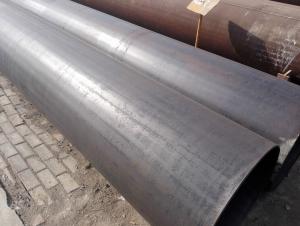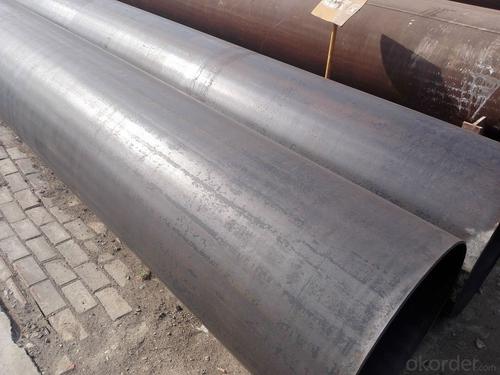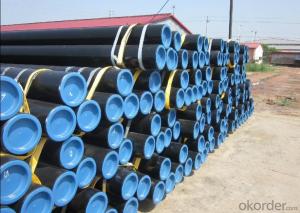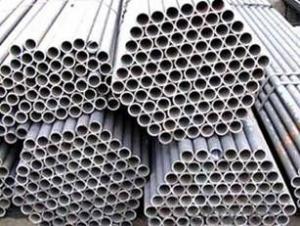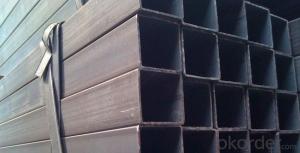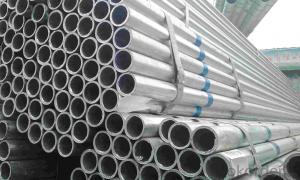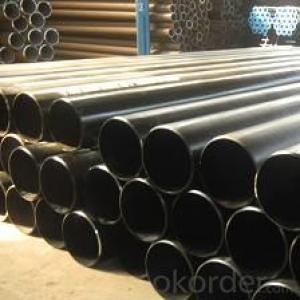Seamless steel pipe for water delivery pipeline
- Loading Port:
- Tianjin
- Payment Terms:
- TT or LC
- Min Order Qty:
- 30 m.t.
- Supply Capability:
- 15000 m.t./month
OKorder Service Pledge
OKorder Financial Service
You Might Also Like
1、Structure of Seamless steel pipe for water delivery pipeline:
Seamless pipe is formed by drawing a solid billet over a piercing rod to create the hollow shell. As the manufacturing process does not include any welding, seamless pipes are perceived to be stronger and more reliable. Historically seamless pipe was regarded as withstanding pressure better than other types, and was often more easily available than welded pipe.
2、Main Features of Seamless steel pipe for water delivery pipeline
• High manufacturing accuracy
• High strength
• Small inertia resistance
• Reasonable price
3、 Seamless steel pipe for water delivery pipeline Specification:
Standard | GB, DIN, ASTM ASTM A106-2006, ASTM A53-2007 |
Grade | 10#-45#, 16Mn 10#, 20#, 45#, 16Mn |
Thickness | 8 - 33 mm |
Section Shape | Round |
Outer Diameter | 133 - 219 mm |
Place of Origin | Shandong, China (Mainland) |
Secondary Or Not | Non-secondary |
Application | Hydraulic Pipe |
Technique | Cold Drawn |
Certification | API |
Surface Treatment | factory state or painted black |
Special Pipe | API Pipe |
Alloy Or Not | Non-alloy |
Length | 5-12M |
Outer Diameter | 21.3-610mm |
Grade | 20#, 45#, Q345, API J55, API K55, API L80, API N80, API P110, A53B |
Standard | ASME, ASTM |
1) Material:20#(ASTM A 106/A53 GRB.API5LGRB,GB),45#,16Mn,10#.
2) Specification range:OD:21.3-610mm,WT:6-70mm,length:6-12m or according to the requirement of clients.
3) Excutive standards:GB,ASME API5L.ASTM A 106/A53,Despite of the above standards,we can also supply seamless steel pipe with standard of DIN,JIS,and so on,and also develop new products according to the requirements of our clients!
4、Packaging & Delivery
Packaging Details: | seaworthy package,bundles wrapped with strong steel strip |
Delivery Detail: | 15-30days after received 30%TT |
5、FAQ of Seamless steel pipe for water delivery pipeline:
①How is the quality of your products?
Our products are manufactured strictly according to national and internaional standard, and we take a test
on every pipe before delivered out. If you want see our quality certifications and all kinds of testing report, please just ask us for it.
Guaranteed: If products’ quality don’t accord to discription as we give or the promise before you place order, we promise 100% refund.
②How about price?
Yes, we are factory and be able to give you lowest price below market one, and we have a policy that “ for saving time and absolutely honest business attitude, we quote as lowest as possible for any customer, and discount can be given according to quantity”,if you like bargain and factory price is not low enough as you think, just don’t waste your time.Please trust the quotation we would give you, it is professional one.
③Why should you chose us?
Chose happens because of quality, then price, We can give you both.Additionally, we can also offer professional products inquiry, products knowledge train(for agents), smooth goods delivery, exellent customer solution proposals.Our service formula: good quality+good price+good service=customer’s trust
SGS test is available, customer inspection before shipping is welcome, third party inspection is no problem.
6、Seamless Seamless steel pipe for water delivery pipeline Images:
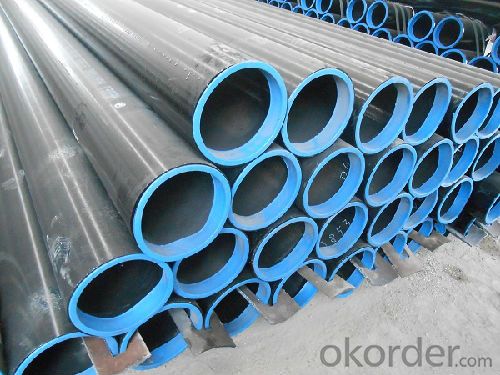
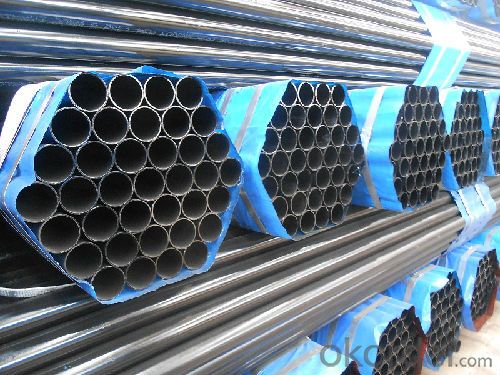
- Q: How are steel pipes insulated to prevent noise transmission?
- Steel pipes are typically insulated using specialized materials that are specifically designed to reduce noise transmission. These insulation materials, such as foam or mineral wool, are wrapped around the steel pipes to create a barrier that absorbs sound waves and prevents them from traveling through the pipes. Additionally, the insulation is often covered with a protective layer, such as aluminum or PVC, to further enhance the soundproofing properties and provide mechanical protection to the insulation.
- Q: How are steel pipes used in the automotive exhaust systems?
- Steel pipes are commonly used in automotive exhaust systems because steel is a durable and heat-resistant material. Steel pipes are used to transport the exhaust gases from the engine to the muffler and tailpipe, ensuring that the gases are safely and efficiently expelled from the vehicle. These pipes are designed to withstand high temperatures, corrosion, and vibration, making them an essential component in the exhaust system.
- Q: How are steel pipes coated to prevent external corrosion?
- Steel pipes are coated to prevent external corrosion through a process called external coating. This typically involves applying a layer of protective material, such as epoxy or polyethylene, onto the surface of the steel pipe. The coating acts as a barrier, preventing moisture and other corrosive substances from coming into contact with the steel. This helps to prolong the life of the pipe and maintain its structural integrity.
- Q: What are the limitations of using steel pipes?
- There are several limitations to using steel pipes in various applications. Firstly, steel pipes can be quite expensive compared to other materials such as plastic or copper. This cost factor can be a significant limitation for projects with tight budgets. Secondly, steel pipes are susceptible to corrosion. Over time, exposure to moisture and certain chemicals can cause steel pipes to rust and deteriorate. This can lead to leaks, reduced structural integrity, and ultimately, the need for costly repairs or replacement. Another limitation of steel pipes is their weight and rigidity. Steel pipes are generally heavier and less flexible than other types of pipes, making them more challenging to install and maneuver in certain settings. Additionally, their rigid nature makes them less suitable for applications that require significant movement or flexibility. Furthermore, steel pipes can be prone to thermal expansion and contraction. When exposed to extreme temperatures, steel pipes can expand or contract, potentially causing stress on joints, fittings, or other components. This can lead to leaks or even pipe failure if not properly accounted for. Lastly, steel pipes are not as resistant to certain chemicals or substances as other materials. Some chemicals can corrode or erode the inner lining of steel pipes, compromising their integrity and potentially causing contamination or leakage. While steel pipes have many advantages, it is important to consider these limitations when deciding on the most suitable material for a specific application.
- Q: What are the different types of steel pipe coatings for drinking water pipelines?
- The different types of steel pipe coatings for drinking water pipelines include cement mortar lining, polyurethane lining, epoxy lining, and polyethylene wrapping. These coatings are applied to the interior and/or exterior of the pipes to prevent corrosion and ensure the safety and quality of the water being transported.
- Q: Can steel pipes be used for underground fuel storage systems?
- Yes, steel pipes can be used for underground fuel storage systems. Steel pipes are commonly used for underground fuel storage due to their durability, strength, and resistance to corrosion. Additionally, steel pipes can be easily welded and sealed, ensuring a secure storage system for fuels.
- Q: What are the different types of pipe fittings used with steel pipes?
- There are several types of pipe fittings commonly used with steel pipes, including elbows, tees, reducers, flanges, couplings, and unions.
- Q: Can steel pipes be used for petrochemical plants?
- Yes, steel pipes can be used for petrochemical plants. Steel pipes are often preferred in petrochemical plants due to their high strength, durability, and resistance to corrosion, making them ideal for handling various chemicals and substances involved in petrochemical processes. Additionally, steel pipes can withstand high pressure and temperature conditions commonly encountered in petrochemical plants, making them a reliable choice for transporting fluids and gases.
- Q: How are steel pipes used in transportation?
- Steel pipes are commonly used in transportation for various purposes, such as in the construction of pipelines for transporting oil, gas, and water. They are also utilized in manufacturing vehicles, ships, and airplanes, where they serve as structural components or exhaust systems. Additionally, steel pipes are employed in the transportation of goods through conveyor systems and in the construction of railings and barriers for safety on roads and bridges.
- Q: What is the difference between steel pipes and polyethylene pipes?
- Steel pipes are made of a strong and durable material, steel, which makes them suitable for high-pressure and high-temperature applications. They are also resistant to corrosion, making them ideal for transporting liquids and gases. On the other hand, polyethylene pipes are made of a flexible plastic material, which makes them easier to install and handle. They are lightweight, resistant to chemicals, and have a low risk of corrosion. However, they may not be suitable for very high-pressure or high-temperature applications.
Send your message to us
Seamless steel pipe for water delivery pipeline
- Loading Port:
- Tianjin
- Payment Terms:
- TT or LC
- Min Order Qty:
- 30 m.t.
- Supply Capability:
- 15000 m.t./month
OKorder Service Pledge
OKorder Financial Service
Similar products
Hot products
Hot Searches
Related keywords
